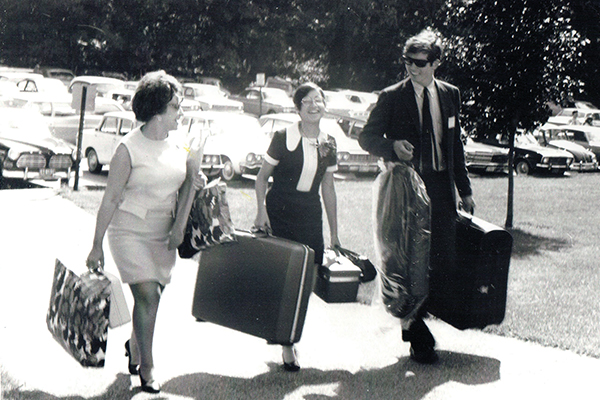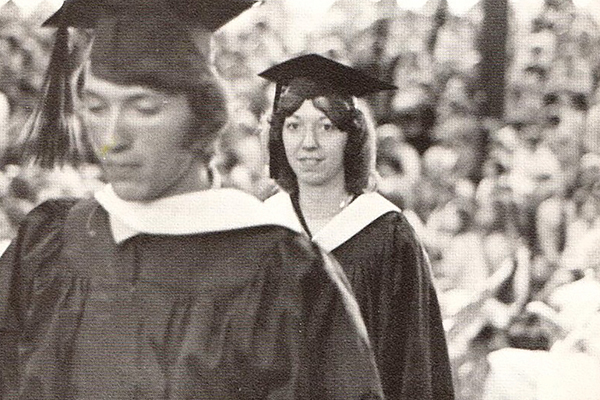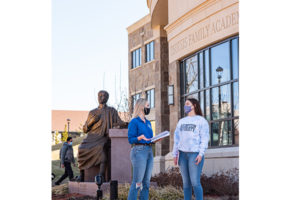
In 1969, Assumption admitted the first coeducational class in the institution’s history. Here, we commemorate the 50th anniversary of the September that changed history.
Women have outnumbered men in colleges across the nation for the past 35 years. Visit Assumption today, and you’ll see a campus in step with the times: in 2017–18, 962 men and 1,519 women enrolled in Assumption’s undergraduate and graduate programs.
Although the institution first admitted female undergraduates only 50 years ago, since then they have established a legacy of confident leaders and athletes, researchers and successful entrepreneurs. These dynamic thinkers and doers are shaping our nation’s future.
“Now, more than ever, it’s important to remind these young women of the people who have come before them,” said writer and property manager Maureen Ryan Doyle ’73.
Pioneers and Tea Parties
In September 1969, first-year students arrived on campus for orientation before the returning students, as was the tradition, and participated in familiar ice breaker activities like a tug-of-war that ended with a dunk in the pond for the losing team. But there was one significant difference: this class included women for the first time in Assumption’s history.
The 125 coeds were warmly greeted with roses and tea parties. As nice as these touches were, the first women at Assumption were eager to find equal footing with their male classmates. “We all felt a bit like pioneers,” said Fran- ces Anthes ’73. “We expected to live in a world where we could be leaders, and that attitude was reinforced while we were at Assumption.”
While most of the 198 first-year males easily accepted the idea of having women on campus, that wasn’t the case with many older students. “Some of them outright said that we were just there to find a husband and get our MRS degrees,” recalled Deborah Downes Cahill ’73, a clinical social worker who is a behavioral UM care manager at Healthfirst.
“They’d chosen Assumption based on it being a men’s school,” said Joanne Ferrechia Willis ’73. “The advent of girls was a shock.”
Probably not as much of a shock to them as to the priests, added Denise Bissonnette Oswald ’73. “The priests were incredibly patient, but our behavior must have been so shocking. It was the ’60s and a crazy time to be young,” said Oswald, the niece of Fr. George Bissonnette, A.A. ’43, the 12th president of Assumption.
The women refused to be intimidated, throwing themselves enthusiastically into academics and activities. “We knew society was changing dramatically,” said Willis. “We wanted to be part of that change.”
The TimesThey Were a-Changin’
The societal changes under-way in 1969 weren’t only dramatic. They were seismic. Like most colleges and universities, Assumption was swept up in the civil rights push for both gender and racial equality and in the country’s turmoil over the Vietnam War.
On December 1, 1969, the Selective Service System held draft lotteries, “and that was on the mind of every one of our male classmates,” said Elizabeth Costanza Schran ’73. “If your number came up, you went to Vietnam. People were holding their breaths over it.”
Being at the institution during such turbulent years taught the women of ’73 to be independent and outspoken. “I learned to be my own person,” said Schran, the first female undergraduate from Assumption to study abroad.
“Assumption helped me become the activist I continue to be,” said Anthes, who was president and CEO of Family Health Center of Worcester until her recent retirement.

Making a Lasting Impact
Just as Assumption’s first female students were transformed by their experiences on campus, they forever changed the institution. For instance, their class included members of the very first women’s athletic team: crew.
Oswald called the experience of rowing for Assumption “a real game changer,” one that inspired her to be physically active all her life.
The women in that first coed class continued being pioneers after graduation, forging a variety of careers. They held public office and volunteered at schools, churches, and community centers.
“I’ve had lots of jobs where I’ve been the odd person out, holding unique roles in multidisciplinary settings,” said Cahill, a pioneer in the rapidly growing field of managed care. “It was easier for me to be confident because I not only had a great education from Assumption, but the experience of having to speak up for myself in rooms full of men.”
“Being part of that first class made me unafraid to take on new challenges,” said Doyle. “Assumption taught me how to be flexible and resilient as the workplace and society kept changing.” As co-chair of the Worcester Women’s Oral History Project, she has spearheaded the collection of 400 oral histories by women; by 2020, she hopes to hit the 500 mark to celebrate the 100th anniversary of women’s suffrage.
Schran called her Assumption education “an exciting adventure,” adding, “We were all forging a new way to live.” Today, she is director of corporate and foundation relations at Saint Joseph’s College in Maine.
Rather than follow a traditional career path, Willis chose to be active in civic organi- zations and her parish. She has served as a city councilor and legislative assistant. While living in Ohio, she worked for the diocesan tribunal and directed the mission cooperative plan, “an unusual position for a lay woman.” She is currently a pastoral assistant at Good Shepherd Catholic Church in Cumming, GA.
Oswald taught preschool, and then became a patient advocate at Memorial Sloan Kettering Cancer Center. Since retirement, she has been a volunteer board member with a nonprofit agency, the Marydell Faith and Life Center. Her Assumption education laid the foundation for her to take advantage of new opportunities, she said. “We were encouraged to broaden our perspectives, take risks, and really be ourselves.”
Anthes, winner of numerous community leadership awards, agreed. “Thanks to our fine education, the belief the faculty had in us, and the support of our classmates, we left Assumption feeling confident that we could make positive contributions to society. That’s exactly what we did.”


